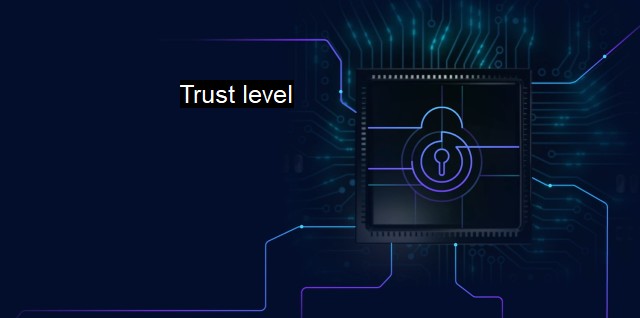What is Trust level?
Exploring the Concept of Trust Levels in the World of Cybersecurity and Antivirus: Factors, Impact, and Importance for Users and Providers
Trust levels are an important concept in the world of cybersecurity and antivirus. Trust level refers to the level of reliability and trust that a user has in a particular piece of software, application, or service. As more and more of our daily interactions take place in digital spaces, trust levels become one of the most crucial factors in ensuring our online safety and security.Trust levels can be impacted by various factors such as past experiences, level of personal or professional familiarity with the software, security features, and brand reputation. trust levels directly impact the user's confidence about the integrity of the system, the protection of data privacy and sensitivity, and freedom of malware and viruses.
In the field of cybersecurity and antivirus software applications, user's trust levels are related to the level of effectiveness against malicious or unwanted software, including spyware, ransomware, exploiters, and cybercriminals. Trust level influences user-perception, and is thus important for product advertisements, distinguishing product quality, and risk assessment of different products in the eyes of the user.
It is difficult to gain and maintain trust levels with users. One breach of trust can (and typically takes) permanently dent the reputation of a software solution or a product. This is why cybersecurity solution providers remain under intense regulatory and scrutiny mechanisms. Industry associations such as the New Information Security Certification Alliance (NISC) enforce a code of ethics for the professionals, outlining firm ethical expectations from cybersecurity professionals dealing with Net Security.
Maintaining trust levels and public confidence in antivirus and cybersecurity software applications requires various across-the-board trust-building measures concerning privacy and data sensitivity, data breach response, marketplace elasticity, customer-centric services, and established delivery timelines carefully managed by safe and trust vectors. Developed market regulatory systems reform efforts under experts specialized in critical infrastructure designation safeguard the economic and public fear of real possible risk after cyber-events such as Ukraine's power grid attack in 2016 or, most recently, ransomware attacks mid-pandemic in hospitals globally.
In broad strokes, trust happens when an entity meets necessary expectations and provides guarantees on-demand while balancing risk management by understanding authorized access threats. If an entity provides robust access to sensitive data on one hand or does not adequately consider cybersecurity measures in marketing campaigns, PR management, and compliance measures, going against ethical industry procedures inviting instances of fiduciary cyber events may negatively impact the trust of customers- both current customers and potential customers. Therefore, compliance and ethical cyber behaviors are necessary-- achieving reasonable trust necessitates ethical standards as coding compliance or Regulatory Information disclosure provisions.
Trust levels in software and IT applications have become increasingly critical given their prime moving role in contemporary society. Billions of dollars of e-commerce transactions, thousands of hours of online work and recreation, official government record-keeping of sensitive data, healthcare management platforms, air traffic control, and more highly vital emergency services are all automated processes constantly managed by software. Unequivocally, broad training, ownership of data shadowing authorization passed, advocating cybersecurity standards due in part to trust levels being a system-by-system crucial aspect.

Trust level FAQs
What is trust level in cybersecurity?
Trust level in cybersecurity refers to the level of confidence or assurance given to a particular software or system. This level of trust can be influenced by factors such as the reliability, authenticity, and security features of the software or system.How does antivirus software affect trust level?
Antivirus software plays a crucial role in maintaining high trust levels in cybersecurity. The software is designed to protect against malware, virus attacks and other security breaches that can threaten the integrity of the system. The use of reliable antivirus software can contribute significantly to the overall trust level of a system by providing an added layer of protection against cyber threats.What factors influence trust level in antivirus software?
Trust levels in antivirus software can be influenced by various factors, such as the reliability, accuracy, and effectiveness of the software in detecting and preventing malware attacks. Other factors that can affect trust levels include the speed of updates, the level of customer support provided, and the software's ability to deal with new and emerging cyber threats.How can trust levels be increased in cybersecurity and antivirus?
Trust levels in cybersecurity and antivirus can be increased by implementing strong security measures, providing regular software updates, and conducting regular security audits. The use of reputable antivirus software and the adoption of best practices in cybersecurity can also help to increase trust levels by providing assurance that the system is secure and protected against cyber threats.| | A | | | B | | | C | | | D | | | E | | | F | | | G | | | H | | | I | | | J | | | K | | | L | | | M | |
| | N | | | O | | | P | | | Q | | | R | | | S | | | T | | | U | | | V | | | W | | | X | | | Y | | | Z | |
| | 1 | | | 2 | | | 3 | | | 4 | | | 7 | | | 8 | | |||||||